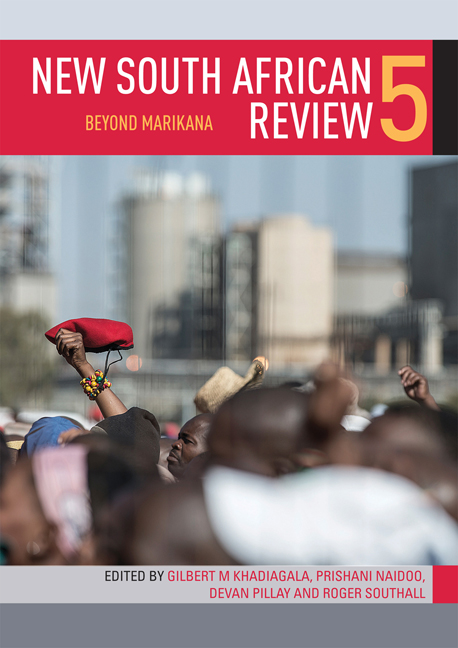Book contents
- Frontmatter
- Contents
- Preface
- Introduction: Political reconfigurations in the wake of Marikana
- PART 1 NEW POLITICAL DIRECTIONS?
- PART 2 ECONOMY, ECOLOGY AND LABOUR
- PART 3 STATE AND SOCIETY
- Introduction to Part 3
- Chapter 8 Constitutionalism: An ‘unqualified human good’?
- Chapter 9 People's Parliament? Do citizens influence South Africa's legislatures?
- Chapter 10 Corruption
- Chapter 11 Marikana and the politics of public order policing
- Chapter 12 ‘In December we are rich, in January we are poor’: Consumption, saving, stealing and insecurity in the kasi
- PART 4 SOUTH AFRICA IN THE INTERNATIONAL ARENA
- Contributors
- Index
Chapter 9 - People's Parliament? Do citizens influence South Africa's legislatures?
from PART 3 - STATE AND SOCIETY
Published online by Cambridge University Press: 21 April 2018
- Frontmatter
- Contents
- Preface
- Introduction: Political reconfigurations in the wake of Marikana
- PART 1 NEW POLITICAL DIRECTIONS?
- PART 2 ECONOMY, ECOLOGY AND LABOUR
- PART 3 STATE AND SOCIETY
- Introduction to Part 3
- Chapter 8 Constitutionalism: An ‘unqualified human good’?
- Chapter 9 People's Parliament? Do citizens influence South Africa's legislatures?
- Chapter 10 Corruption
- Chapter 11 Marikana and the politics of public order policing
- Chapter 12 ‘In December we are rich, in January we are poor’: Consumption, saving, stealing and insecurity in the kasi
- PART 4 SOUTH AFRICA IN THE INTERNATIONAL ARENA
- Contributors
- Index
Summary
INTRODUCTION
The people of South Africa are the Parliament, which is why it is called the ‘People's Parliament’ … The people you voted for are accountable to you, as it is you who elected them. It is their duty to listen to your opinions and needs. They must make sure the views of the voters are taken into account when they vote for laws. And they must report the decisions of Parliament back to you, the people. Everything they do and say must be open so that you, the voter can know what decisions are being made. So the people actively working for Parliament are there because the people of South Africa have put them there. And it is their duty to work for and represent every citizens [sic] of South Africa.
South Africa's democracy goes beyond the international standards by which a representative democracy requires the continuous political participation of the public. Chapter 4 of the Constitution of the Republic of South Africa (1996) deals with the role and functions of the legislatures and entrenches Parliament at the centre of democracy, giving meaning to this promise of participatory democracy. It provides the framework for a National Assembly to ‘ensure government by the people under the Constitution’ and it goes further to note (in section 42(3)): ‘It does this by choosing the president, by providing a national forum for public consideration of issues, by passing legislation and by scrutinising and overseeing executive action.’ The National Development Plan 2030 (NDP) echoes the constitutional mandate, recognising the role of the legislatures to enable public participation and ensure executive accountability. A discussion on the independence and performance of the legislatures must therefore include questions of public access and influence. ‘Come to parliament and become a professional puppet’ read one protester's placard outside Parliament on 25 February 2014. ‘It's not a people's parliament, it's a parties’ parliament’ opined a conference participant at the People's Power, People's Parliament Conference in 2012 (Ben-Zeev 2014).
Questions have persisted regarding the will and capacity of the elected representatives to perform their functions of law making, representivity and oversight independently of political parties, and regarding their lack of accountability to the voting public (Friedman 2012).
- Type
- Chapter
- Information
- New South African Review 5Beyond Marikana, pp. 171 - 187Publisher: Wits University PressPrint publication year: 2015



